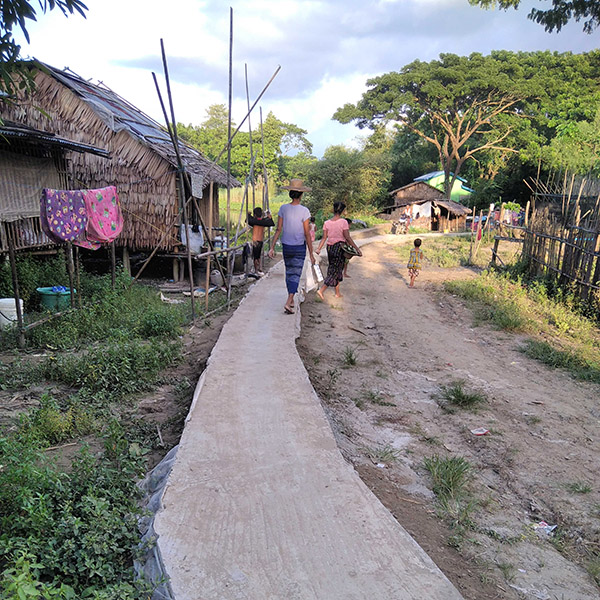Stories of Change

A newly-poured concrete road in the village of Mee Thew Chaung, Myanmar.
Paved Roads Make Travel Easier in Myanmar
Maubin Township in Myanmar is in the Ayeyarwady River delta. Every year, the river floods. This is leading to riverbank erosion that impacts homes, community buildings and farmland. It’s so extreme that in some cases villages move every 7-10 years!
Since 2018, CWS has worked with a dozen communities near Maubin to focus on Disaster Risk Reduction. This means putting systems and infrastructure in place that will prevent disasters or lessen the severity of their impact. By the start of 2022, 17 villages had participated in activities from emergency drills to road repair work. Most recently, communities have partnered with CWS to install solar electricity at public buildings such as evacuation centers and heath posts.
For communities that deal with flooding and other challenging weather conditions, road renovation is an opportunity to make life a lot easier. Dirt paths – often marked with sizeable holes and usually muddy or flooded between June and September – are the most common transportation routes among villages and to larger towns and cities. For many communities, safe and reliable roads are the second most priority (the first is year-round access to safe water). Roads mean the ability to get to schools, markets, health centers and temples. The existing paths, though, are dusty when the weather is dry and rainy when it’s wet. By paving a road, you make it safer and cleaner. You also enable people to go faster, since many people use bikes or motorbikes.
Our team knows that with reasonable training, village volunteers can team up with skilled masons to transform their dirt paths to paved roads. It can be done quickly and with a minimal investment. The more durable way to do this, which CWS helped communities start doing in 2021, is to pour concrete footpaths that are three feet side and four inches thick. When a community decides to do this, CWS funds the purchase of cement, gravel and sand. Each 1,000 feet of paved road uses 130 bags of cement, 1,000 cubic feet of gravel and 750 cubic feet of sand. It takes about three hours of construction time for each 100 feet of road work. Communities organize volunteers to do the construction work. Skilled masons (paid by CWS) lead the volunteers through the construction. Each foot of construction costs $1.40.
Building roads may not be glamorous, but it means a huge increase in the quality of life of the people who use them. It takes less fuel for a motorbike to use a smooth, paved road, so it’s less expensive for families to get goods to market. Sick children or adults can reach health centers faster and in more comfort, and it’s easier for them to travel farther to district hospitals for more advanced care. Running errands and getting to school are also much easier and more convenient.
Ko Tun Min, who lives in Ta Khun Taing village, said, “Our village road was muddy in the rainy season, and it is very risky to walk around. Our elders and pregnant women dare not to go outside during rainy season as they are worried about falling. Although we planned for improving the roads in the past, we simply did not have the funds to do it. However, now our village road is better than before, which allows us to travel more safely during the day and night for all activities from getting to work and markets, to attending schools and reaching health posts for medical treatment.”
